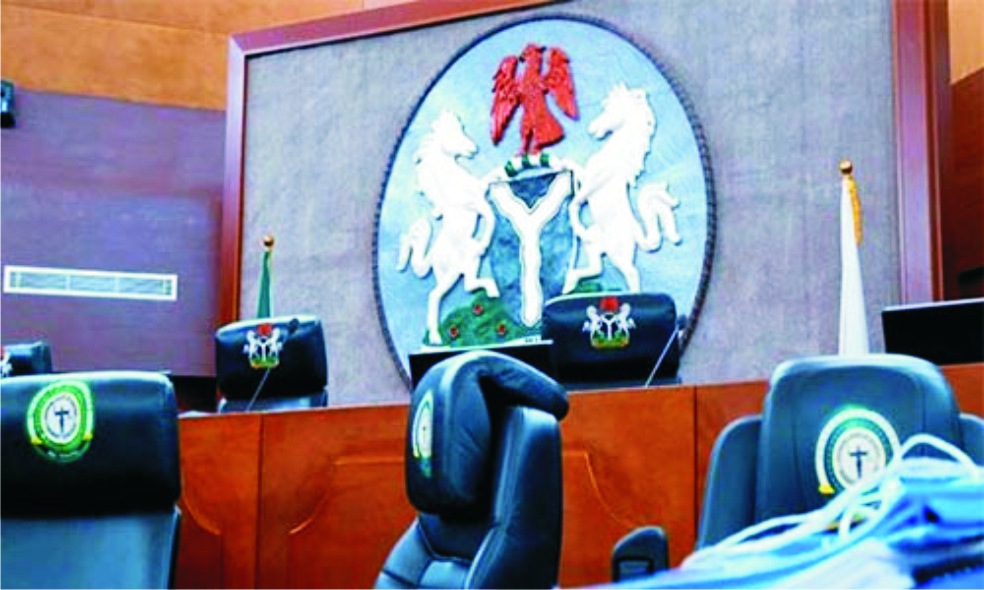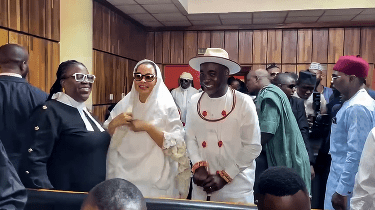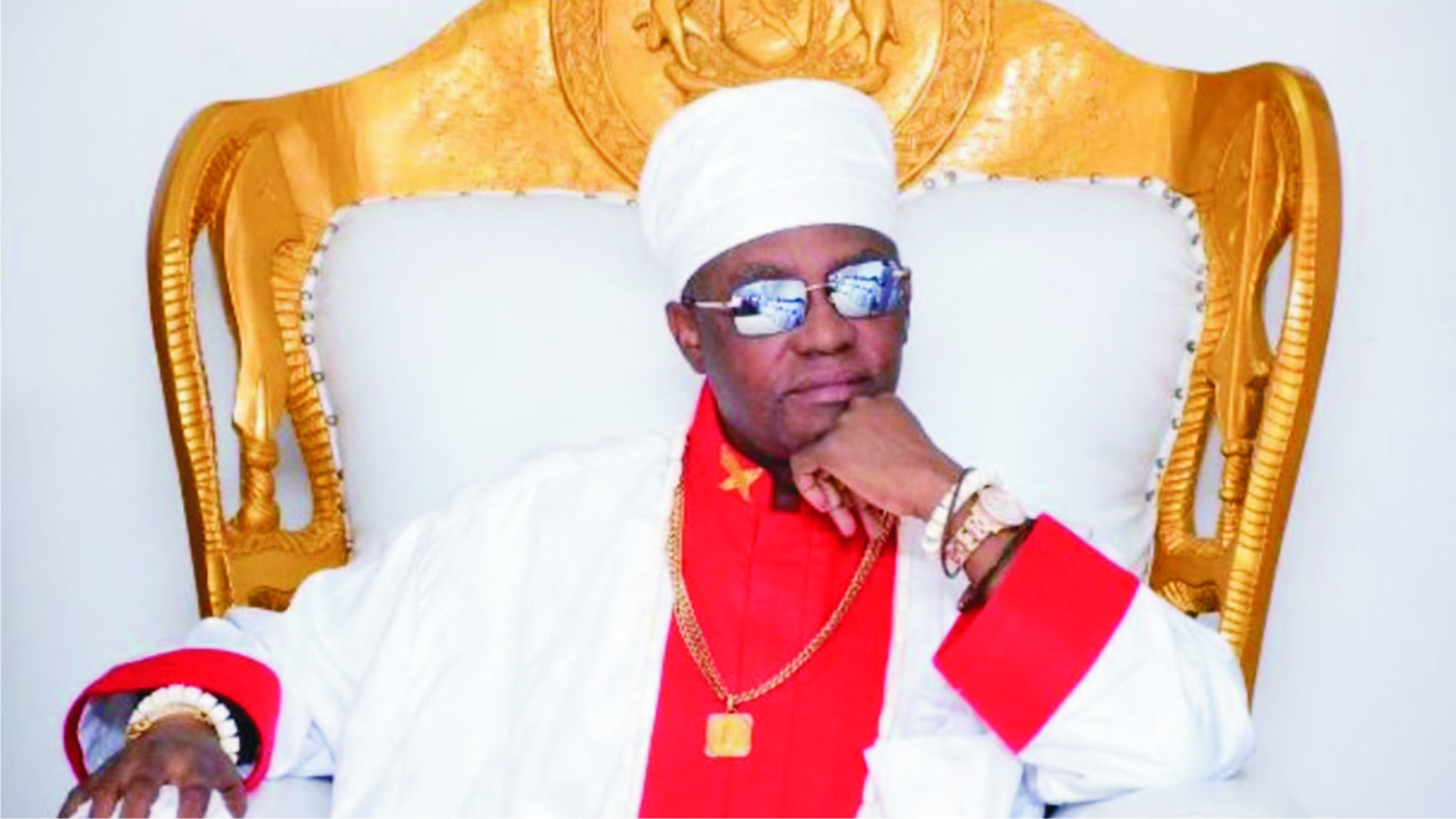News
Anxiety In Kogi As Supreme Court Decides Gov’s Fate, Today

An air of uneasiness has enveloped Kogi State as parties to the dispute over the last governorship election in the state anxiously await the verdict of the Supreme Court scheduled to be handed down in Abuja, today.
The nation’s apex court is expected to deliver two judgments on the two surviving appeals on the dispute over whether or not the candidate of the All Progressives Congress (APC) and incumbent Governor, Alhaji Yahaya Bello, was lawfully returned by the Independent National Electoral Commission (INEC) as the winner of the November 16, 2019 election.
The first appeal, marked: SC/CV/388/2020, was filed by the Peoples Democratic Party (PDP) and its candidate, Engr Musa Wada, while the second one was filed by the Social Democratic Party (SDP) and its candidate, Ms Natasha Akpoti.
The appellants are, among others, praying the court to reverse the judgments of the Court of Appeal, which upheld the decisions of the election tribunal, affirming Bello’s victory at the poll.
There was a third appeal filed by the Democratic People’s Party (DPP) and its candidate, Usman Mohammed, but it did not survive the court’s last proceedings on August 25, 2020.
The appellants’ lawyer, M. S. Ibrahim applied to withdraw it on realising that his clients’ case would not fly.
The appellants had challenged INEC’s disqualification of DPP’s candidate, who was said to be 31 years old as against the 35 years allowed by law.
Upon Ibrahim’s oral application for withdrawal, the court’s seven-man panel, led by the Chief Justice of Nigeria (CJN), Justice Ibrahim Muhammad, struck out the appeal, and awarded N200,000 cost against the appellants and in favour of the APC and Bello.
On the same day, the court entertained arguments from lawyers to parties in the appeals by the PDP and SDP and their candidates, following which it adjourned till August 31, 2020, for judgment in both appeals.
Lawyer to the PDP and Wada, Jibrin Okutepa (SAN), while adopting the appellants’ brief of argument, prayed the court to allow his client’s appeal, and grant the reliefs contained therein.
Okutepa contended, among others, that the five Justices of the Court of Appeal erred in law when they upheld the majority decision of the election tribunal, which validated Bello’s election.
On their part, lawyers to the Independent National Electoral Commission (INEC), Bello and APC – Alex Izinyon (SAN), Joseph Daudu (SAN) and Ahmed Raji (SAN) – urged the court to reject the appeal on the grounds that it lacked merit.
They prayed the court to retain the concurrent findings of the Court of Appeal and the majority decision of the tribunal, to the effect that Bello was validly returned as the winner of the election.
Similar arguments were made in relation to the appeal by the SDP and Akpoti
The PDP and Wada, in their appellants’ brief of argument, raised five issues for the court’s determination.
They are: “Whether the Court of Appeal acted without jurisdiction and in breach of the right to fair hearing of the appellants when it considered and determined the appeal before it on issues that did not arise from the majority judgment of the trial tribunal and or the notice and grounds of appeal filed before it.
“Whether the Court of Appeal was right in affirming the decision of the trial tribunal striking out several paragraphs of the appellants’ petition and deeming grounds ‘B’ and ‘C’ of the petition to have been abandoned.
“Whether the Court of Appeal was not in grave error in holding that the evidence of PWl9 (the forensic expert) and his report (exhibit P185A) have no evidential value.
“Considering the peculiar facts and circumstances of this case, whether the court below was right in holding that the failure by the appellants to call polling unit agents in the polling units complained of in the seven contested local government areas of Kogi State is fatal to the petition.
“The Court of Appeal rejected the reasons given by the trial tribunal for not according weight to the evidence of PW19 and exhibit P185A as can be seen on pages 5,175 to 5,176 of the record, volume 12 thereof. But, in breach of the right to fair hearing of the appellants, the court below suo motu (on its own volition) gave its own reasons and discountenanced the evidence of PW19 and exhibit P185A as can be seen on pages 5,175 to 5,176 of the record, volume 12 thereof”.
Izinyon raised two issues for the court’s determination in the first respondent’s brief of argument he filed for INEC.
They are: “Whether the court below was right in law in affirming some of the decisions of the trial tribunal granting the prayers in the various interlocutory applications of the respondents.
“Whether the lower court was right in dismissing the appellants’ appeal, having regard to the state of pleadings and the evidence led by the appellants at the trial tribunal.”
In his second respondent’s brief of argument, Bello raised three issues for the court’s determination.
They are: “Whether the court below considered in its judgment, issues raised suo motu that neither arose from the trial tribunal’s judgment nor raised by the second respondent.
“Whether the court below was right to have arrived at the conclusion that the appellants could not rely on facts and particulars pleaded specifically in support of the already abandoned grounds ‘B’ and ‘C’, relating to non-compliance and corrupt practices, to establish their principal and only surviving ground of complaint to wit: that the second respondent did not score majority of lawful votes in the said election.
“Whether, having regard to the ground of majority of lawful votes relied upon by the appellants, the court below was correct when it affirmed the conclusion of the trial tribunal that the appellants failed to prove that the second respondent was not elected by majority of lawful votes”.
The PDP and Wada had, shortly after INEC announced the result of the election, filed a petition on December 7, 2019, before the Kogi State Governorship Election Petition Tribunal, which sat in Abuja.
On May 23, 2020, the tribunal, in a split decision of two-to-one, dismissed the petition and upheld INEC’s return of Bello as the winner of the election.
The tribunal’s Chairman, Justice Kashim Kaigama, and a member, Justice Baraka Wali, gave the majority decision, while another member, Justice Ohimai Ovbiagele, gave the minority dissenting judgment, upholding the petition and voiding Bello’s election.
The PDP and Wada appealed the majority decision of the tribunal at the Court of Appeal in Abuja.
But in a judgment on July 4, 2020, the appellate court’s five-man panel was unanimous in dismissing the appeal, and proceeded to uphold the majority decision of the tribunal.
On the Court of Appeal’s panel were Justices Adamu Jauro, Haruna Simon Tsammani, Onyekachi Aja Otisi, Elfreda O. Williams-Daudu and Mohammed Lawal Shuaibu.
The PDP and Wada again appealed to the Supreme Court, which heard the case on August 25 and scheduled the judgment for August 31, 2020.
The case by SDP and Akpoti has a similar history but for the fact that there was no split in the tribunal’s decision given on May 18, 2020.
The tribunal was unanimous in dismissing their petition.
On appeal to the Court of Appeal, a five-man panel of the court, in a judgment on July 4, 2020, dismissed the appeal for lacking in merit; a decision the SDP and Akpoti further appealed to the Supreme Court.
The judgment on the same case at the apex court is also slated for today.
News
RSG Moves To Diversify Rivers Economy …As Farmers, Others Laud Ibas Over Implementation Of RAAMP

The Rivers State Government has restated its readiness to diversify the economy of the state from oil to Agriculture.
This is as farmers and other stakeholders have commended the Sole Administrator of Rivers State, Vice Admiral Ibok-Ete Ibas (Retd) for approving the implementation of Rural Access and Agricultural Marketing project (RAAMP) in the state.
Permanent Secretary, Rivers State Ministry of Agriculture, Mr Maurice Ogolo, said this during a meeting on implementation of RAAMP in Ikwerre, Eleme and Ogba Egbema Ndoni Local Government Areas.
Ogolo said the programme would create an agricultural industrial hub in the 23 local government areas, and urged the people to embrace the project.
Meanwhile, rural farmers and other stakeholders in the State have lauded Ibas for approving the implementation of RAAMP in the State.
RAAMP is a world bank program with support from the International Development Association ( IDA), the French Development Agency and the Federal Government of Nigeria.
According to a statement made available to newsmen, the programme aims to strengthen the institutional and financial base for sustainable management of state and rural networks, fostering historic development to enhance food security, creating access in rural communities to boost agricultural processes through creation of durable access roads and agro logistics centres/hub.
Tide source confirms that the program has been in operation since 2020 with 19 states benefitting.
The benefitting states are Kano, Katsina, Sokoto, Kebbi and Bauchi.
Other beneficiaries are Plateau, Kwarra, Ondo, Niger, Gombe, Anambra, Cross River, Taraba and Benue states.
The source said that 12 new states including Rivers State recently completed their requirements for inclusion into the RAAMP 3.
Speaking at the stakeholders’ meeting at Isiokpo, Nchia and Omoku, headquarters of Ikwerre, Eleme and Ogba/Egbema/Ndoni local government areas respectively, a cross section of farmers described the programme as timely as it would boost food production as well as create markets for agricultural produce.
At Eleme, HRH Emere J D Nkpe warned against politicising the project.
The people also complained against incessant destruction of crops by herdsmen and called for it to be checked.
Also speaking at Omoku headquarters of Ogba Egbema Ndoni Local Government Area,Eze Allison Dan and Barrister Lola Nwaribe commendation the government for the program but warned against it going the way of other programmes.
For Barrister Nwaribe Women in the area needs assistance to break free from subsistence agriculture
Speaking at the three ocal government areas Ogolo said Rear Admiral Ibok Ete Ibas rtd needs to be commended for approving the implementation of the program in the state.
Ogolo said the program is aims at diversifying Rivers economy from oil to Agriculture.
He said the program will also enable farmers to move from subsistence farming to commercial agriculture, adding that access roads will not only be created to farms but markets will be built for farmers to sell their produce.
He listed other benefits to include creation of employment for the youths and helping small traders to boost sales.
Also speaking the state RAAMP Coordinator,Mr Joshua Kpakol said the “the essence of this project is to provide rural access roads and improve agricultural marketing systems across the 23 Local Government Areas of the state”
Kpakol said the project is divided into three components which are improvement of Rural Access and Trading Infrastructure, Sector Reform,Asset management and Agro logistics performance Enhancement and Institutional Development, Project Management and Risk Mitigation.
He urged farmers and traders to embrace the project as it would go along way in changing their fortunes.
At Ikwerre and Eleme local government areas respectively, the sole administrators of the two councils Hon Isaiah Christian and Dr Gloria Obo Dibiah said the councils will work towards the success of the program.
They commended President Bola Ahmed Tinubu and the Sole Administrator of Rivers state for ensuring that their respective councils benefits from the programme.
John Bibor
News
Defamation: Court Grants Natasha N50m Bail

The FCT High Court in Abuja, yesterday, granted the suspended Senator representing Kogi Central Senatorial District, Natasha Akpoti-Uduaghan, bail in the sum of N50 million and one surety who must be a person of reasonable integrity resident in F.C.T Abuja and owns a landed property within the Abuja Municipal Area Council.
The trial judge, Justice Chizoba Orji, made the declaration in a ruling after taking arguments for and against the bail application from the parties in the suit.
The Attorney General of the Federation, in a three-count criminal charge marked CR/297/25, accused Akpoti-Uduaghan, the sole defendant, of making defamatory statements against the Senate President, Godswill Akpabio, during a live television broadcast.
The charge, which lists Akpabio and the former Kogi State Governor, Yahaya Bello, as nominal complainants, alleged that Akpoti-Uduaghan claimed Bello had conspired with Akpabio to orchestrate her assassination outside Abuja, disguising it as a mob or local attack.
According to the Federal Government, these allegations were made during a live broadcast on Channels Television’s Politics Today on April 3, 2025.
The Federal Government claimed that Akpoti-Uduaghan knowingly or recklessly made these imputations, fully aware that they could harm the reputation of the individuals involved.
The charge alleged that she said, “Let’s ask the Senate President, why in the first instance did he withdraw my security, if not to make me vulnerable to attacks? He then emphasised that I should be killed, but I should be killed in Kogi. What is important to me is to stay alive, because dead men tell no tales. Who is going to get justice for me?”
The charge also cites her statements during the programme as saying, “That you, Senator Natasha Akpoti-Uduaghan, on or about the 3rd day of April 2025, during the same Politics Today programme on Channels Television in Abuja, Federal Capital Territory, made the following imputation concerning Yahaya Adoza Bello, former Governor of Kogi State.
“It was part of the meeting, the discussions that Akpabio had with Yahaya Bello that night, to eliminate me. When he met with him, he then emphasised that I should be killed, but I should be killed in Kogi. You knew or had reason to believe that such imputations would harm the reputation of Yahaya Adoza Bello, former Governor of Kogi State.”
The senator is also accused of making defamatory statements about Akpabio during a telephone conversation with Sandra C. Duru in Abuja on March 27, 2025.
The alleged statement is as follows, “That girl that was killed, what’s her name, umm…. Imoren Iniubong, her organs were actually used for the wife, because the wife was really ill… when they killed the girl, and her organs were used for the wife.”
The Federal Government contends that Senator Akpoti-Uduaghan knew or ought to have known that this claim would harm the reputation of Senator Godswill Akpabio.
Meanwhile, the Senate President, Bello, and four others have been listed as witnesses in the trial.
The arraignment of Akpoti-Uduaghan was initially scheduled for June 3, 2025. However, the strike action of the Judiciary Staff Union of Nigeria stalled the arraignment.
Meanwhile, a similar matter is also lodged before Justice Muhammed Umar, of the Federal High Court in Abuja.
While Senator Akpoti-Uduaghan was slated for arraignment before Justice Umar, she, however, did not appear for the arraignment since the prosecution had not been able to serve her as stated in court.
The prosecution, however, applied for a bench warrant to be issued on the suspended senator, which the court refused.
At the commencement of the hearing, the counsel to the Attorney General of the Federation, David Kaswe, told the Court that the matter is for arraignment of the defendant (Senator Akpoti-Uduaghan).
Natasha was docked, and the three-count read to her. She pleaded not guilty to all the charges.
Akpoti-Uduaghan’s legal team, led by Professor Roland Otaru (SAN), afterwards informed the Court that a bail application filed on May 27 has been submitted to the court.
Kaswe, however, informed the court that the Federal Government is opposing the bail application and called the attention of the judge to a counter-affidavit filed before the court to this effect.
He proceeded to ask the court to remand the Kogi Senator in prison as she poses a flight risk.
He said, “In view of the charge, we will be asking for a remand in a correctional facility.
The defence counsel, however, interjected, stating, “We already filed an application for bail. We are in a court of law for Justice. We have a motion on Notice dated May 27, 2025. You represent the Ministry of Justice, not the Ministry of Injustice.
“If your lordship graciously will, we urge your lordship to grant the bail application. This is a case where your lordship has the discretion to grant bail, and nobody can query it, not even the president can query it. Even on self-recognition because it is not a case of murder.”
Referencing the Administration of Criminal Justice Act, Otaru added that anybody who is charged with a criminal offence shall be presumed innocent until proven guilty. “And she pleaded not guilty. As she is standing there, she is innocent until proven otherwise,” he added.
Justice Chizoba Orji, after listening to both arguments, however, granted Natasha bail in the sum of N50 million, with one surety who must be a person of reasonable integrity resident in F.C.T Abuja and owns a landed property within the Abuja Municipal Area Council.
News
Benin Monarch Receives 119 Stolen Artefacts From Netherlands

Oba of Benin, Ewuare II, has received 119 stolen artefacts from the Netherlands.
The Oba who disclosed this on Wednesday in Benin, the Edo State capital, said plans by some international cartel to re-loot the artefacts were thwarted after he prayed to God and the ancestors.
He said, “I thank President Bola Tinubu for supporting and committing to the efforts former President Buhari put in place to ensure the artifacts are not re-looted because there were groups in this country believed to be an international cartel that had all sorts of conspiracy to re-loot our artifacts.
“They stole and burnt our Kingdom. They killed my people and tried to kill their spirit and their morale. Today, the boldness, courage, and bravery of the Benin people are still there. Events of 1897 reduced that to a significant level that Sometimes when I see my people, they are afraid of the unknown.
“The return of these objects has reawakened the courage we had in our people. We do not want modern-day politics and partisan politics to diminish the courage of our people.
“The Director General of the National Commission for Museums and Monuments has been doing wonderful work. His predecessor was part of the conspiracy to re-loot our artefacts. We had a running battle in this hall.
“I addressed my Chiefs in Benin language, and I said these artefacts belong to my ancestors, and I will not sit on the ancient throne and watch the artefacts re-looted. They would rather remain where they are than be re-looted. I thank the government of the Netherlands for working with us. This is part of the efforts to reawaken the morale and spirit of my people.
“After 1897, the kingdom was reduced. There was a government in this state that wanted to reduce the kingdom more and scatter it. I am angry when I speak about it. Why would anybody want to scatter the kingdom.
“The youths were courageous like the youths of those days. They were not afraid of anybody. I vowed that it would not happen. Not in my reign. Not while I am sitting on this throne. God heard my prayers. My ancestors heard my prayers. This throne is not partisan, but I should support what is good for my people.
“I urge the youths to be tough and strong in the face of adversity. This is not for anybody else. It is for my ancestors.”
The Benin Monarch further prayed for the return of more artefacts.
The NCMM DG, Olugbile Holloway, said the commission and the Benin Royal Palace were working hard to ensure more artefacts were returned.
Edo State Governor, Monday Okpebholo, who was represented by the Secretary to State Government, Barr. Musa Ikhilor said his administration would continue to build necessary infrastructure to preserve the returned artefacts as well as collaborate with the Federal Government to improve the storage system for the artefacts.
The General Director of the Wereld Museum, Marieke Van Bommel, said, “The artefacts are looted, and we have a policy in the Netherlands to bring them back. We are bringing back 119 artefacts. We don’t have more. These are the collections in the Netherlands. There are more collections in Europe, but that is not up to us. They have been with us for over 100 years.”
-
News3 days ago
Tinubu Inaugurates Institute Of Vocational Training, 100 CNG Buses In Kaduna
-

 News3 days ago
News3 days agoRSG Moves To Diversify Rivers Economy …As Farmers, Others Laud Ibas Over Implementation Of RAAMP
-
Business3 days ago
PINL Initiatives, Operational Etiquette Excites Bayelsa Stakeholders
-
Business3 days ago
MWUN Backs Nigeria’s Bid For IMO’s Category C Seat
-
Politics3 days ago
Members’ Ego Responsible For PDP Crisis, Not About Atiku Alone -Gov Lawal
-

 News3 days ago
News3 days agoStudent Loan Application Process Now Fully Digitized -NELFUND
-
News3 days ago
Media Powerful, Central Player In Fight Against Insurgency -CDS
-
Rivers3 days ago
Foundation Tasks Parents, Families In Moral Rectitude

